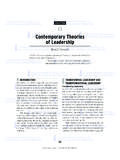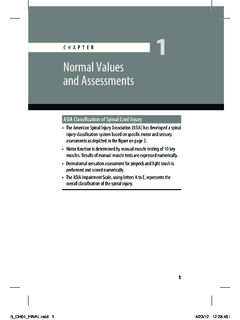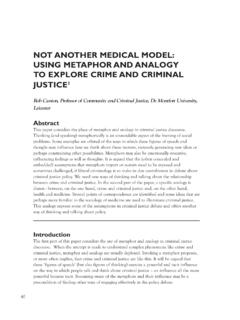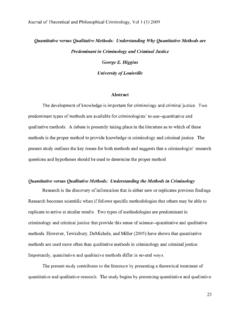Transcription of Comparative Criminal Justice: Theoretical …
1 Comparative Criminal justice : Theoretical Perspectives4 CHAPTER OUTLINEI ntroductionModernization Theory and Comparative Criminal JusticeCrime and Modernization: The Classical IdeasCrime and Modernization: The Contemporary IdeasCrime and Modernization: Some Empirical EvidenceCivilization Theories and Comparative Criminal JusticeTheory of the Civilizing Process: Norbert EliasTheory of Civilizational Clash: Samuel HuntingtonTheory of Civilizational Complexes and Intercivilizational Encounters: Benjamin NelsonWorld-Systems Theory and Comparative Criminal JusticeThe Analytical Framework and Key HypothesesCrime Trends in the Core and the PeripheriesCrime Trends in the World System of Capitalism: Some Empirical EvidenceGlobalization Theory and Comparative Criminal JusticeThe Analytical Framework and Key HypothesesThe Extent and the Intensity of GlobalizationThe Effect of Globalization on Criminal JusticeSummaryDiscussion QuestionsReferencesIntroductionThe Criminal justice systems of the world s 195 countries represent diverse ways in which crime, law, and justice are pursued and perceived around the world.
2 At the same time, these systems have similar issues and challenges. Such diversities and similarities raise many scientific curiosities and Theoretical puzzles. Why are the world s systems of Criminal justice different from one another? How are those 558/29/2012 4:19:21 PM8/29/2012 4:19:21 PM Jones & Bartlett Learning, LLC. NOT FOR SALE OR DISTRIBUTION. Jones & Bartlett Learning, LLCNOT FOR SALE OR DISTRIBUTION Jones & Bartlett Learning, LLCNOT FOR SALE OR DISTRIBUTION Jones & Bartlett Learning, LLCNOT FOR SALE OR DISTRIBUTION Jones & Bartlett Learning, LLCNOT FOR SALE OR DISTRIBUTION Jones & Bartlett Learning, LLCNOT FOR SALE OR DISTRIBUTION Jones & Bartlett Learning, LLCNOT FOR SALE OR DISTRIBUTION Jones & Bartlett Learning, LLCNOT FOR SALE OR DISTRIBUTION Jones & Bartlett Learning, LLCNOT FOR SALE OR DISTRIBUTION Jones & Bartlett Learning, LLCNOT FOR SALE OR DISTRIBUTION Jones & Bartlett Learning, LLCNOT FOR SALE OR DISTRIBUTION Jones & Bartlett Learning, LLCNOT FOR SALE OR DISTRIBUTION Jones & Bartlett Learning, LLCNOT FOR SALE OR DISTRIBUTION Jones & Bartlett Learning, LLCNOT FOR SALE OR DISTRIBUTION Jones & Bartlett Learning, LLCNOT FOR SALE OR DISTRIBUTION Jones & Bartlett Learning.
3 LLCNOT FOR SALE OR DISTRIBUTION Jones & Bartlett Learning, LLCNOT FOR SALE OR DISTRIBUTION Jones & Bartlett Learning, LLCNOT FOR SALE OR DISTRIBUTION Jones & Bartlett Learning, LLCNOT FOR SALE OR DISTRIBUTION Jones & Bartlett Learning, LLCNOT FOR SALE OR DISTRIBUTION Jones & Bartlett Learning, LLCNOT FOR SALE OR DISTRIBUTION differences historically, politically, and culturally created and embedded? How are the world s systems of Criminal justice also becoming more and more similar? Why are they increasingly facing similar challenges? The core Theoretical question is: How are the world s different systems of Criminal justice connected? What are the overarching cultural, civilizational, and global processes that are making these systems connected and integrated, and how is that connectivity shaping the thoughts, ideas, and philosophies about crime, law, and justice among the world s societies today?
4 This chapter will describe four Theoretical perspectives that explain this connectivity among the world s systems of Criminal justice : modernization theory, civilization theory, world-systems theory, and globalization Theory and Comparative Criminal JusticeModernization is one of the most dominant Theoretical perspectives in contemporary social science, including sociology, political science, anthropology, Comparative law, Comparative edu-cation, development economics, and Comparative Criminal justice . Modernization theory has generated an enormous amount of literature in the last 5 decades in all branches of social science. The roots of modernization theory go back to the days of the development of social science in the middle of the 19th century in Europe, when different branches of social science emerged to bring the scientific method into social analysis. One of the first projects of social scientific analysis was to theorize about the social, economic, and cultural transformations that were unfolding in Europe in the wake of the disintegration of feudalism and monarchical political systems.
5 Modernization theory emerged in the context of that time of great transformations in Europe to theorize about the nature of the emerging modern society and the future of human-ity s search for a good society. The classical theorists of modernization developed a number of hypotheses that are still at the core of social science, including criminology and Criminal and Modernization: The Classical IdeasOne of the major hypotheses of modernization theory is that with the progress of modern-ization, societies are more likely to change from agricultural to industrial economies. With this change in the economy, politics is more likely to move from monarchy and absolutism to democracy. With the transition to industrialization, urbanization, and democracy, crime is more likely to grow. However, as industrialization advances and democracy matures, the crime rate is more likely to drop. The second hypothesis is that modernization is primarily a process of cultural change from tradition to modernity.
6 Modernity is not just an industrial economy or a huge process of urbanization. It is a complex set of cultural values that put a premium on democracy, individualism, secularization, equality, science, reason, and modernization theorists of 19th century classical sociology and social science in general, such as Karl Marx (1818 1883), Gabriel Tarde (1843 1904), Emile Durkheim (1858 1917), Georg Simmel (1858 1918), Ferdinand T nnies (1855 1936), and Max Weber (1864 1920), theorized about relations between crime and modernization. Marx was excited to see the disintegration of feudalism and the birth of capitalism in front of his eyes in Europe 56 CHAPTER 2 Comparative Criminal justice : Theoretical 568/29/2012 4:19:23 PM8/29/2012 4:19:23 PM Jones & Bartlett Learning, LLC. NOT FOR SALE OR DISTRIBUTION. Jones & Bartlett Learning, LLCNOT FOR SALE OR DISTRIBUTION Jones & Bartlett Learning, LLCNOT FOR SALE OR DISTRIBUTION Jones & Bartlett Learning, LLCNOT FOR SALE OR DISTRIBUTION Jones & Bartlett Learning, LLCNOT FOR SALE OR DISTRIBUTION Jones & Bartlett Learning, LLCNOT FOR SALE OR DISTRIBUTION Jones & Bartlett Learning, LLCNOT FOR SALE OR DISTRIBUTION Jones & Bartlett Learning, LLCNOT FOR SALE OR DISTRIBUTION Jones & Bartlett Learning, LLCNOT FOR SALE OR DISTRIBUTION Jones & Bartlett Learning, LLCNOT FOR SALE OR DISTRIBUTION Jones & Bartlett Learning, LLCNOT FOR SALE OR DISTRIBUTION Jones & Bartlett Learning, LLCNOT FOR SALE OR DISTRIBUTION Jones & Bartlett Learning, LLCNOT FOR SALE OR DISTRIBUTION Jones & Bartlett Learning, LLCNOT FOR SALE OR DISTRIBUTION Jones & Bartlett Learning, LLCNOT FOR SALE OR DISTRIBUTION Jones & Bartlett Learning.
7 LLCNOT FOR SALE OR DISTRIBUTION Jones & Bartlett Learning, LLCNOT FOR SALE OR DISTRIBUTION Jones & Bartlett Learning, LLCNOT FOR SALE OR DISTRIBUTION Jones & Bartlett Learning, LLCNOT FOR SALE OR DISTRIBUTION Jones & Bartlett Learning, LLCNOT FOR SALE OR DISTRIBUTION Jones & Bartlett Learning, LLCNOT FOR SALE OR DISTRIBUTIONin the middle of the 19th century. But in his analysis of the structure of the capitalist economy in his Das Kapital (1867/2007), Marx theorized that it is inherently an exploitative economic system. Under capitalism, crime would be endemic among the working class because of their pauperization, alienation, powerlessness, and all the classical sociologists of the 19th century, Tarde was one who was formally regarded in his time as a criminologist. He was the director of Criminal justice at the Min-istry of justice in France, which published his ideas about crime and justice in Comparative Criminality in 1886 (New World Encyclopedia, 2008).
8 Tarde (1912) theorized that crime is not a biological phenomenon, but that it is social in origin. He hypothesized that the crime rate will be higher in societies where the strategic and ruling elites fail to maintain a balance between modernity (innovations) and tradition (the maintenance of cultural patterns). Tarde s idea that crime is a learned behavior, learned from peers and in association with others, predates Edwin Sutherland s differential association sociologist Simmel, in his The Metropolis and Mental Life (1903/1971) theorized that modern cities and modern life are more likely to generate crimes because of conflicts between the demands of radical individualism and the demands of collectivity. In his The Philosophy of Money (1978), Simmel predicted the negative effect of consumerism on crime and deviance in modern societies. From the same generation of German sociologists, T nnies (1957) theorized that with modernization, societies are more likely to move from gemeinschaft (community) to gesellschaft (society).
9 Whereas gemeinschafts are character-ized by the dominance of informal social relations and informal social control institutions, gesellschafts are rational organizations dominated by formal laws and formal social control institutions. The crime rate is more likely to be higher, according to T nnies, in societies that have lost the influence and the power of their informal social control Weber, another leading theorist of modernity who came from Germany, claimed that societies undergoing modernization are more likely to develop rational-legal authority and rational bureaucracy in all spheres of life, including law and justice . The societies expe-riencing modernization are more likely to develop a political regime based on the rule of law and rational-legal authority. In a modern state, Weber claimed, the monopolized use of physical force must be based on legitimate and rational-legal systems.
10 In a rational-legal system, laws are formulated by legitimate governmental authorities, and they are not affected by charisma or religion. The states that are based on charismatic authority or traditional authority and traditional legal systems are less likely to progress toward modernity. For Weber, a modern Criminal justice system based on the rule of law cannot emerge in a state based on traditional authority and traditional legal systems (Gerth & Mills, 1958).French sociologist Durkheim, in his books Division of Labor in Society (1893/1964), Suicide (1897/1951), and The Rules of Sociological Method (1895/1964), elaborated a noble conception of crime and justice . Durkheim theorized that crimeless society is not possible, nor is it desirable. It is because of crime that there exists a system of law and justice in soci-ety, and a system of law and justice is the foundation of social order and social solidarity.

















